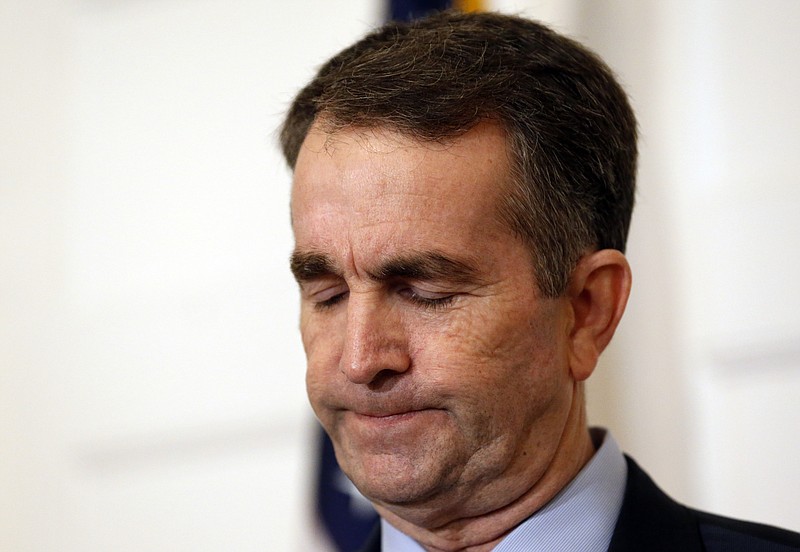You could see it coming a mile away.
When various charges hit the top three executives - all Democrats - in the Commonwealth of Virginia in rapid succession recently, it was quickly realized the fourth in line for governor was a Republican, House Speaker Rep. Kirk Cox.
That changed everything.
Suddenly, Gov. Ralph Northam's remarks about using black face 35 years ago (and an acknowledgement and then denial of another instance of doing so), the sexual assault allegations against Lt. Gov. Justin Fairfax and the similar black face acknowledgement of Attorney General Mark Herring didn't look so bad.
Democrats, who initially were outraged over the governor's admission, including some who demanded his resignation, grew quieter when Fairfax was accused and quieter still when Herring made his statement. A lawmaker who threatened to bring impeachment proceedings Monday suddenly thought better of it.
A group of black clergy and community leaders decided Northam and Herring, who are white, should be given second chances and that any due process against Fairfax, who is black, should play out.
Nervous Democrats, though, worried about the appearance of the governor and attorney general sticking around and the possibility of the lieutenant governor being ousted.
"The sort of irony that makes your head spin is that Herring and Northam are in trouble for behavior related to Virginia's racial past," Quentin Kidd, a political science professor at Virginia's Christopher Newport University, told The Associated Press. "And yet it may be the only African-American statewide officeholder who, at the end of the day, gets in trouble."
However, a different set of black leaders in the commonwealth issued a letter that mapped out a way for Northam and Herring to redeem themselves by offering reparations. They could, the group suggested, remove more Confederate statues and raise money for the state's historically black colleges.
"In our opinion," the letter stated, "it is not enough for you to simply apologize."
In the meantime, Northam - in an apology tour of sorts - called slaves "indentured servants," inviting more wrath, and pondered his staff's suggestion that he read the Alex Haley classic "Roots" and watch D.W. Griffith's 1915 Ku Klux Klan-fueling film "Birth of a Nation."
Elsewhere among Democrats receiving mulligans for their heinous remarks is freshman U.S. Rep. Ilhan Omar, D-Minnesota, who said lawmakers only backed Israel because of political contributions from the American Israel Public Affairs Committee (AIPAC). It was, she said, "all about the Benjamins ($100 bills), baby."
Called on the anti-Semitic remarks, she apologized, as requested by Democrats, as she had previously done for claims that Israel "hypnotizes the world" and descriptions of "the apartheid Israeli regime." But in the same statement, she said she stood by her criticism of AIPAC
Omar's remarks had drawn a rebuke from House Speaker Nancy Pelosi, among others, while Republican House Minority leader Kevin McCarthy promised to take "action" against her.
But now her Democratic colleagues caution that they mustn't go overboard.
Pelosi's No. 2, Majority Leader Steny Hoyer of Maryland, said he takes Omar at her word, that she meant no offense and she wasn't using an anti-Semitic trope about Jewish money.
"I don't think she is anti-Semitic," he said. Removing her from her committee assignments and taking any other action against her are unnecessary, he added.
One needs only look back to last month to see how it works when a Republican says something untoward.
U.S. Rep. Steve King of Iowa unleashed a torrent of criticism in January when he questioned why terms like "white supremacy" were controversial. The Congressional Black Caucus wanted him stripped of his committee assignments, and U.S. Rep. Karen Bass, D-California, said giving "comfort to white supremacists" is "something that should never be allowed in the halls of Congress."
Unlike Democrats with their recent offenders, though, Republicans took action, admonishing his comments and removing him from his committee assignments.
Similarly, during the 2018 elections, Florida Republican gubernatorial candidate Ron DeSantis and U.S. Sen. Cindy Hyde-Smith, R-Mississippi, were vilified not for something they did, not for something they said with impunity (like Omar), but for using the common parlance expressions "monkey this up" and "public hanging," respectively.
DeSantis was accused of using "racist dog whistles" as he criticized a potential socialist agenda his opponent might foster, while Hyde-Smith's words were termed "reprehensible," "shameful" and having "no place in our political discourse" as she praised a cattle rancher in front of a statue of Elvis Presley.
The double standard of treatment of Democrats vs. Republicans was just one of the issues that made voters turn to Donald Trump in 2016. With the recent aforementioned hypocrisy, the Democrats' unveiling of their Green Power Plan, the potential costs of their desired Medicare for All, and the discussion and/or passage by several states of late-term abortion rights, the president will have plenty of other ammunition in 2020.
